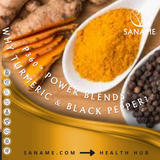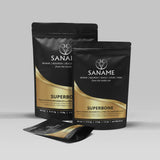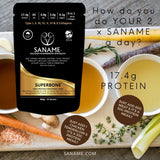Both the CURCUMIN of Turmeric and Piperine of black pepper offer special health benefits of their own — but their unique advantages are much more powerful and effective when the spices are combined. To put it plainly, the two bring out the best in each other. Continue reading to learn why.
What Is Turmeric CURCUMIN?
The key compounds in Turmeric spice are called curcuminoids, which contain CURCUMIN. Also known as the golden spice, Turmeric gives curry its distinctive yellow color. It's a tall plant native to South Asia and is a member of the ginger family, and is both delicious and beneficial for your health. For centuries, natives of South Asian countries have used Turmeric for its outstanding health properties.
Health Benefits of CURCUMIN
CURCUMIN can give you plenty of health benefits. It offers both anti-inflammatory and antioxidant properties. According to research, here are some of the health benefits of CURCUMIN:
- Reduces inflammation: CURCUMIN's anti-inflammatory properties may help ward off several conditions or ease their symptoms. Many chronic diseases involve inflammation, such as heart disease, cancer, arthritis, metabolic syndrome and even depression. CURCUMIN is shown to be effective against the inflammation of these conditions.
- Supports heart health: CURCUMIN can support heart health, helping lower your cholesterol and reduce your risk of cardiovascular diseases.
- Eases bone and joint pain: Another benefit of CURCUMIN is it can help ease bone and joint pain. Those with painful conditions like osteoporosis or arthritis can use the compound to relieve their symptoms. Because of its anti-inflammatory effects, CURCUMIN can also help slow the onset of these conditions.
- Potentially prevents Alzheimer's disease: CURCUMIN also seems to help prevent Alzheimer's disease — in cultures where CURCUMIN is most consumed, rates of Alzheimer's disease are low.
Plenty of advantages might compel you to include CURCUMIN in your diet. However, not all sources of CURCUMIN are equal, and the way you consume the compound has a significant impact on its effectiveness.
Getting CURCUMIN'S Health Benefits
Despite all of CURCUMIN's benefits, your body struggles to absorb it by itself. The reason for this is CURCUMIN's low bioavailability — the extent to which your body can absorb and utilize a substance. Another issue is metabolization, as your body metabolizes and eliminates CURCUMIN too quickly by itself.
For your body to access all of CURCUMIN's health benefits, the compound needs a partner. When CURCUMIN is mixed with Piperine, found in black pepper, your body is better able to absorb and use it. As you combine the CURCUMIN in Turmeric with black pepper, you'll enjoy a lot more benefits. Before we discuss why the two are perfect for each other, you'll need to know what Piperine is.
What Is Piperine?
Just as Turmeric contains the compound CURCUMIN, black pepper contains its own beneficial compound called Piperine. Black pepper is one of the most popular spices in the world, and piperine gives it its distinctive sharp flavor. Like CURCUMIN, Piperine has earned a strong reputation in traditional healing — it's been important in ancient Ayurvedic medicine for thousands of years.
Health Benefits of Piperine
Black pepper's Piperine has many health benefits, featuring anti-inflammatory properties and antioxidant effects. Some of the health benefits of Piperine include its potential ability to:
- Reduce free radicals in the body
- Control tumor growth
- Promote brain function
- Improve digestion
- Reduce inflammation
- Prevent depression
In addition to its own health benefits, one of Piperine's most important qualities is it helps your body absorb CURCUMIN. In this way, it makes CURCUMIN much more effective. In fact, black pepper is an ideal team member, boosting the performance of various pharmaceutical drugs and nutrients. When eaten together, CURCUMIN and Piperine are an incredible duo.
How Does Piperine Help Your Body Absorb CURCUMIN?
So, how does it work? How do Turmeric and black pepper — and their compounds CURCUMIN and Piperine — work together in your body? The issue with CURCUMIN is your body metabolizes and excretes it without absorbing it. Piperine stops this process from happening to the CURCUMIN you eat. As a result, it gives your body an opportunity to absorb CURCUMIN properly. A sprinkle is enough — all it takes is 1/20 of a teaspoon of black pepper to make CURCUMIN bioavailable.
Other Ways to Absorb CURCUMIN
Adding a dash of black pepper is an effective way to reap CURCUMIN's many health benefits, but other methods are available, as well. Consuming Turmeric with a source of fat will allow it to bypass the liver and get absorbed right into your bloodstream. Fat sources could include:
- Avocado
- Nuts or nut butter
- Fish
Of course, combining Piperine with CURCUMIN is the healthiest and most low-fat and effective way to enjoy the spice's benefits, as CURCUMIN and black pepper complement each other better than CURCUMIN and fat sources.
Health Benefits of Combining Turmeric, CURCUMIN and Black Pepper
When you eat CURCUMIN on its own, you miss out on a lot of its advantages. Even if you try to consume the compound on a regular basis, its poor absorption into your bloodstream limits its health benefits. To make the most of the CURCUMIN in your diet, combine it with black pepper.
Together, Turmeric and black pepper can help you stay healthy, as both compounds offer anti-inflammatory effects, pain relief and prevention of many different conditions. A sprinkling of both spices can elevate your nutrition by leaps and bounds.
Recommended Daily Intake
-
1-2 scoops of SANAME P360™ per day
-
Mix with water or your favourite beverages or add to food
-
Consistency: Take SANAME SANAME P360™ daily.
-
Hydration: Drink plenty of water.
-
Balanced Diet: Eat nutrient-rich foods.
-
Get a Little Sun & Ground on the Earth(Sand/Grass/Dirt): Even just 5mins a day HELPS more than you can imagine
- National Institute of Health. (2019). Collagen.
- Journal of Medicinal Food. (2018). Turmeric's Health Benefits.
- Journal of Agricultural and Food Chemistry. (2017). Black Pepper's Bioavailability.
- SANAME Official Website.
- Journal of Pharmaceutical Sciences. (2010). Piperine-Curcumin Co-Administration.
- Journal of Medicinal Food. (2018). Turmeric-Black Pepper Combination.
- National Institute of Health. (2019). Turmeric and Curcumin.
- Ayurvedic and Chinese Medicine texts















